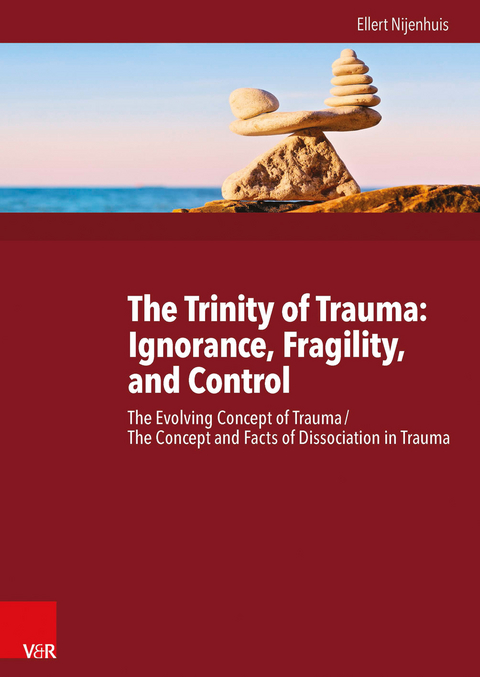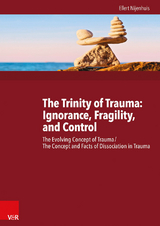The Trinity of Trauma: Ignorance, Fragility, and Control
The Evolving Concept of Trauma / The Concept and Facts of Dissociation in Trauma
Seiten
2015
Vandenhoeck & Ruprecht (Verlag)
978-3-525-40247-4 (ISBN)
Vandenhoeck & Ruprecht (Verlag)
978-3-525-40247-4 (ISBN)
New Definitions of Trauma and Derivative Concepts
The Trinity of Trauma: Ignorance, Fragility, and Control is structured as a trilogy. This book includes the first two parts: Volume I, The Evolving Concept of Trauma, and Volume II, The Concept and Facts of Dissociation in Trauma, which are predominantly conceptual, theoretical, and empirical in nature.Volume I aims to overcome conceptual flaws that have plagued the trauma field to date. It proposes new definitions of trauma and derivative concepts as well as a dimension of trauma-related disorders. It suggests that individuals and their environment constitute, depend on, and are relative to each other. Volume I unites two groups of trauma-related disorders that were previously contrasted in psychiatric history under various names such as "melancholia" versus "hysteria", "traumatic neurosis" versus "traumatic hysteria", and "posttraumatic stress disorder" versus "dissociative disorders". It also mends the "dissociation" of dissociative and conversion disorders.Volume II analyzes and defines the concepts of "personality", "self", "dissociation in trauma", and "dissociative parts". It explores and documents the biopsychosocial features of different prototypical dissociative parts in traumatized individuals. Important features of these parts also characterize other players in traumatization, stretching from perpetrators to society at large.
The Trinity of Trauma: Ignorance, Fragility, and Control is structured as a trilogy. This book includes the first two parts: Volume I, The Evolving Concept of Trauma, and Volume II, The Concept and Facts of Dissociation in Trauma, which are predominantly conceptual, theoretical, and empirical in nature.Volume I aims to overcome conceptual flaws that have plagued the trauma field to date. It proposes new definitions of trauma and derivative concepts as well as a dimension of trauma-related disorders. It suggests that individuals and their environment constitute, depend on, and are relative to each other. Volume I unites two groups of trauma-related disorders that were previously contrasted in psychiatric history under various names such as "melancholia" versus "hysteria", "traumatic neurosis" versus "traumatic hysteria", and "posttraumatic stress disorder" versus "dissociative disorders". It also mends the "dissociation" of dissociative and conversion disorders.Volume II analyzes and defines the concepts of "personality", "self", "dissociation in trauma", and "dissociative parts". It explores and documents the biopsychosocial features of different prototypical dissociative parts in traumatized individuals. Important features of these parts also characterize other players in traumatization, stretching from perpetrators to society at large.
Ellert R. S. Nijenhuis, Ph. D., ist Psychologe, Psychotherapeut und Forscher. Seit mehr als 30 Jahren diagnostiziert und behandelt er schwer traumatisierter Patienten. Er lehrt und publiziert zu traumabezogener Dissoziation und dissoziativen Störungen. Er ist Forschungsberater der Klinik Littenheid (Schweiz) und arbeitet mit mehreren europäischen Universitäten zusammen. Die International Society for the Study of Trauma und Dissociation hat ihm mehrere Preise verliehen, darunter auch für sein Lebenswerk.
| Erscheint lt. Verlag | 22.4.2015 |
|---|---|
| Übersetzer | Joseph A. Smith |
| Zusatzinfo | with 26 figures and 12 tables |
| Verlagsort | Göttingen |
| Sprache | englisch |
| Maße | 170 x 245 mm |
| Gewicht | 1350 g |
| Themenwelt | Geisteswissenschaften ► Psychologie |
| Medizin / Pharmazie ► Medizinische Fachgebiete ► Psychiatrie / Psychotherapie | |
| Schlagworte | Dissoziation • Posttraumatisches Belastungssyndrom • Psychisches Trauma • Psychotraumatologie • Trauma • Traumabewältigung • Trauma (Psychologie) • Traumatherapie • Traumatisierung |
| ISBN-10 | 3-525-40247-3 / 3525402473 |
| ISBN-13 | 978-3-525-40247-4 / 9783525402474 |
| Zustand | Neuware |
| Haben Sie eine Frage zum Produkt? |
Mehr entdecken
aus dem Bereich
aus dem Bereich
Buch | Hardcover (2012)
Westermann Schulbuchverlag
CHF 44,90
Schulbuch Klassen 7/8 (G9)
Buch | Hardcover (2015)
Klett (Verlag)
CHF 29,90
Buch | Softcover (2004)
Cornelsen Verlag
CHF 23,90




